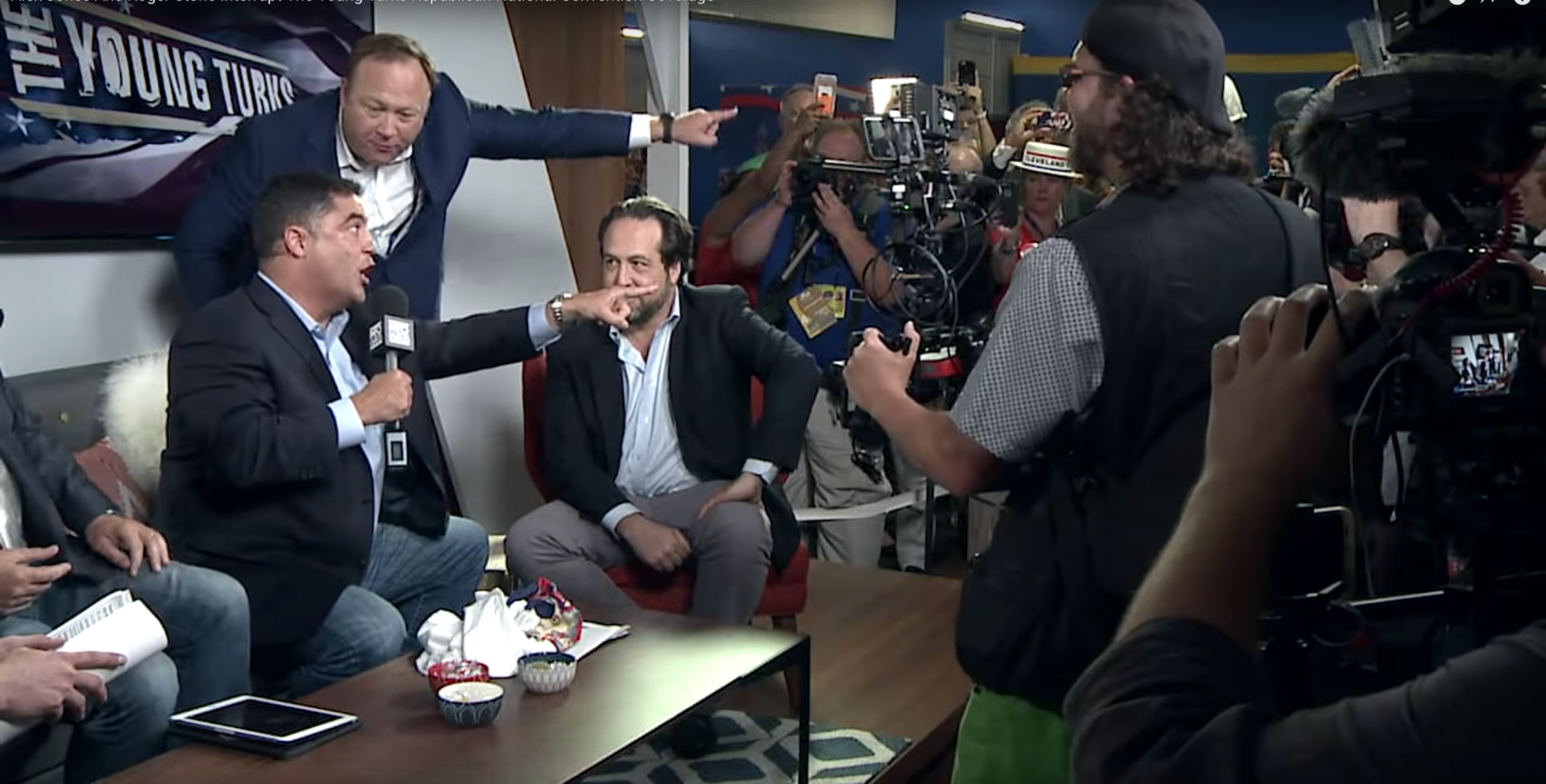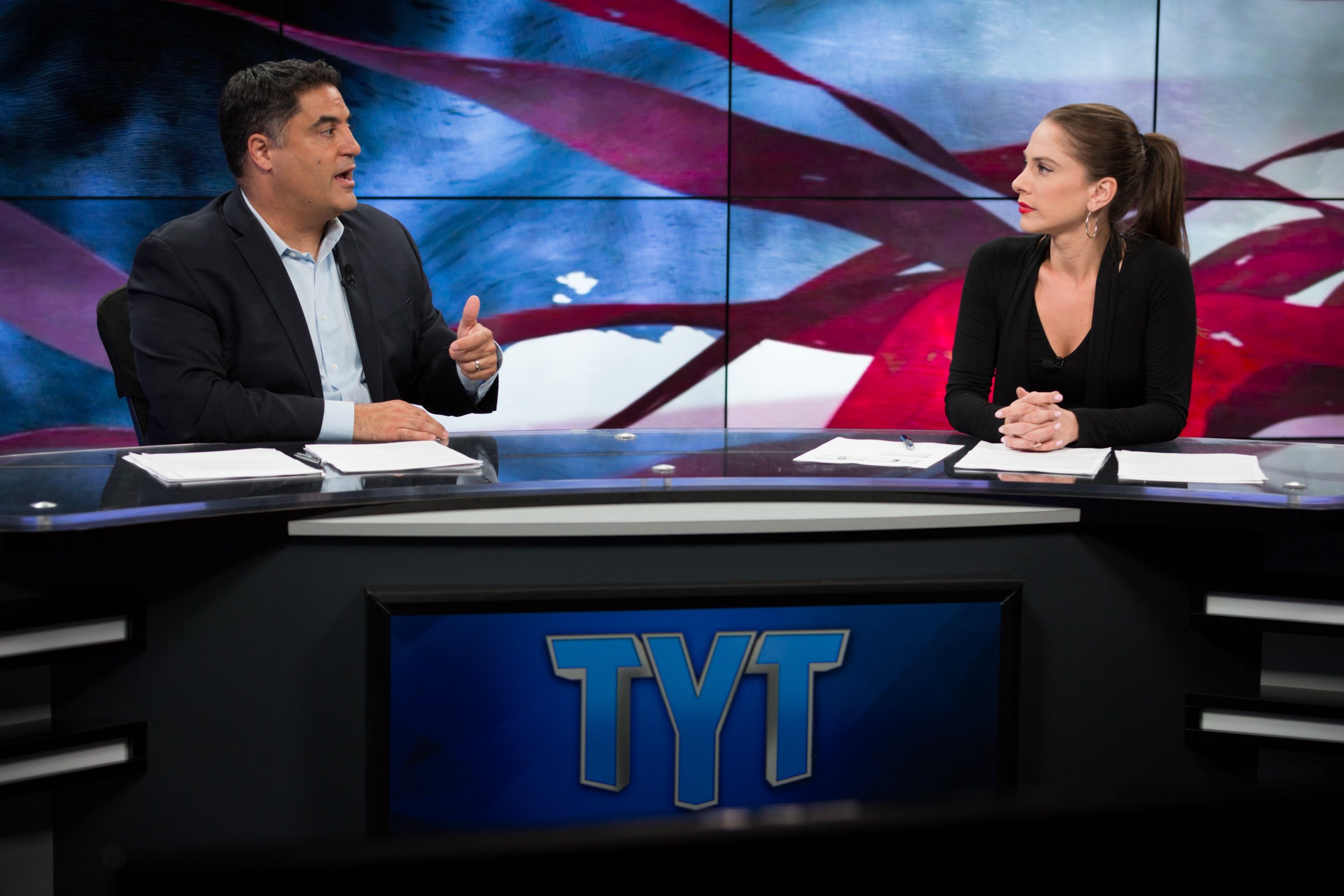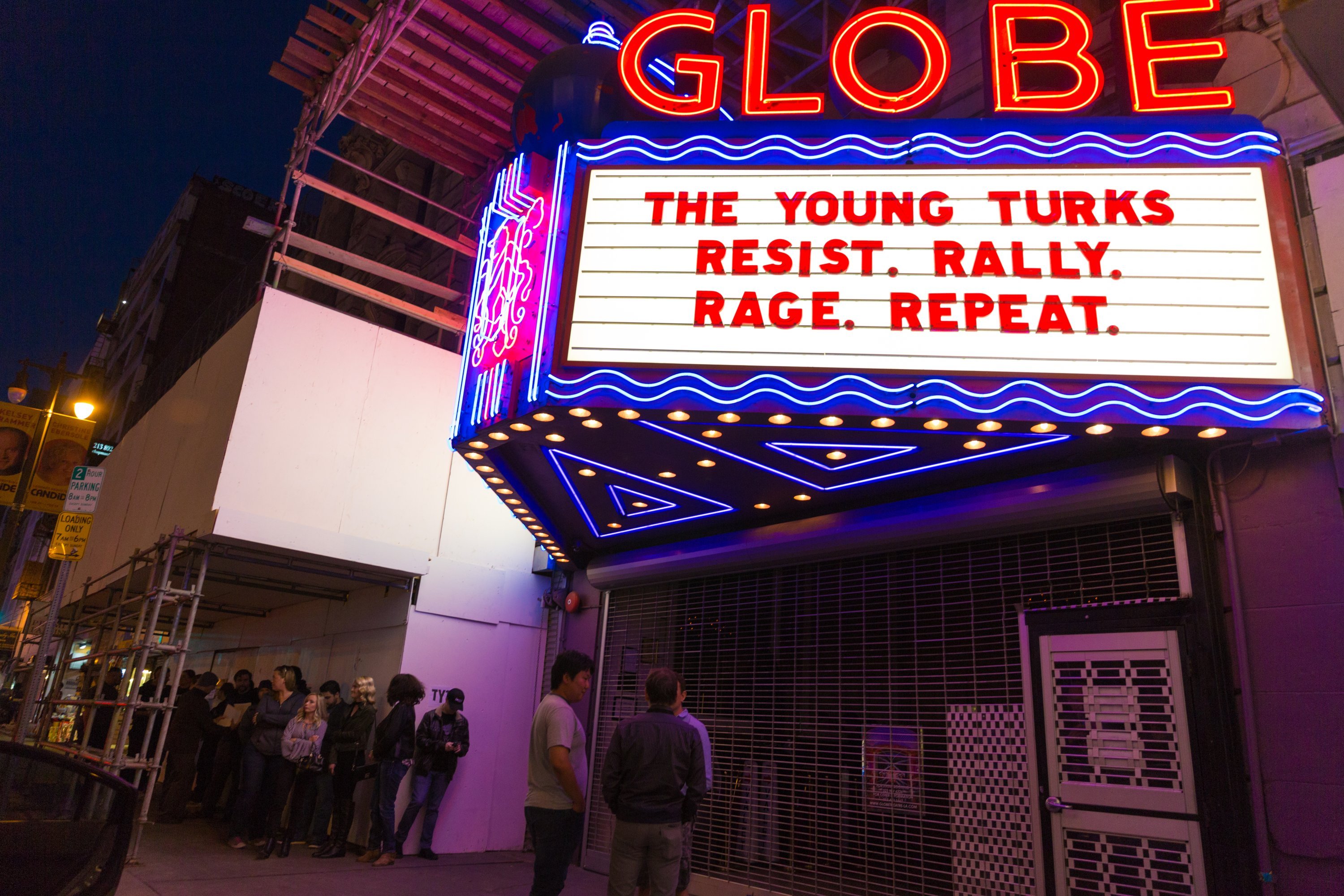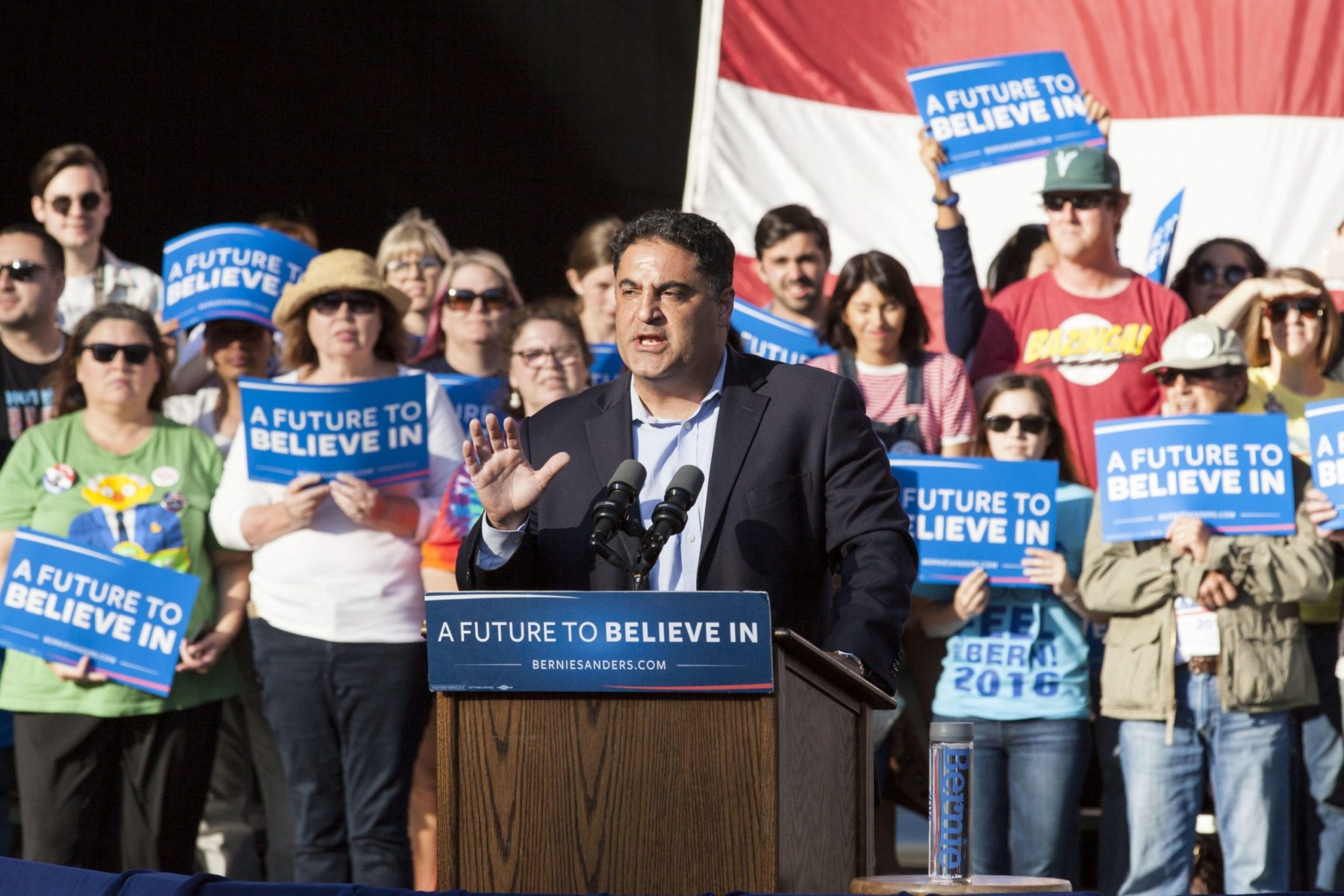When I ask Cenk Uygur to send me his favorite clip of him at his most fired-up, loud-mouthed, truth-talking best, the kind of performance he couldn’t get away with back when he was auditioning for cable news, he picks the “biggest” night of his summer—the night Alexandria Ocasio-Cortez took down Joe Crowley. “If she wins, you have no idea how ballistic I’m going to go,” he tells the Young Turks’ online audience. With half the votes counted, he lands the People’s Elbow on his glass-topped anchor’s desk. And when it’s all over Uygur slams that desk over and over screaming, “God, who would’ve thought that? Who would’ve thought that? We got ‘em!”
It’s a nice clip. But, as anyone who’s been tuning in to watch America’s most pugnacious hard-left talk show host knows, it’s nowhere near his most Not Safe For Network News. There was the time in 2012, for example, when Uygur called religious opponents to abortion “neanderthals.” Or the time he went berserk over coverage of the Iraq War, spittle-screaming that “everyone of these editors in every major newspaper, in every major magazine, in every major television news organization, should be fired today.”
Or the time in Cleveland, at the 2016 Republican National Convention, that Uygur, sweaty and ready to swing, had to be physically restrained during an altercation with a set-crashing Alex Jones, just moments after Uygur threatened Roger Stone across a crowded room: “I should give you a hatchet job!” (Whatever that means.)

Five years ago, it was an unscripted style of broadcasting that would get Uygur fired. Now, it may just be the future of liberal media. Because if you don’t yet recognize Cenk (sounds like Jank) Uygur (U-grr) or the name of his media company the Young Turks, you’re in a diminishing circle. Last summer, Uygur, 48, secured $20 million in venture capital from an investor group that includes Hollywood super-producer Jeffrey Katzenberg, one of Obama’s top campaign contribution bundlers. His online network has 4.1 million Youtube subscribers and this summer, people started downloading its new app. TYT’s videos have more than 4 billion Youtube views. More than Comedy Central’s, or Justin Timberlake‘s.
The out-party in media is often a petri dish for innovation. Think Rush Limbaugh in the Clinton years, Netroots under George W. Bush, and Breitbart and a megaphoned Fox during the Obama years. So perhaps it’s the left’s turn to adapt, to abandon its emotionally cool, empiricist mode and embrace an impassioned, unrehearsed style that churns with the rhythm of the Internet. Because after years of trying to conform to the norms of civil and smooth coverage that make Anderson Cooper and Shep Smith so watchable, the Internet is where Uygur finally found a pulpit to fit his cocksure thundering. He’s a Youtube star at the moment “Youtube star” has ceased to be an embarrassing chyron, a Bernie Bro when the Democratic party has lost the credibility to chastise Bernie Bros. As Ocasio-Cortez made the media rounds after her Crowley knockout, she made sure people knew it was TYT that first put the Blue Wave poster girl on the air. Which is all to say, just because Uygur is screaming and slamming his news desk, doesn’t mean he isn’t exactly where he wants to be.
It’s a mild April evening and we’re standing on the roof of the Hepburn, a Calacatta marble meets Peloton bikes Dupont Circle apartment building overlooking the Washington Hilton, where the White House Correspondents Dinner is about to start. Uygur is usually based in Los Angeles along with most of his progressive news operation, but he’s come to DC to throw his annual WHCD pre-party. An endless stream of guests, including the Intercept’s Ryan Grim and HuffPo Washington Bureau Chief Amanda Terkel, passes by, some offering the host things he says he doesn’t want right now—rosé poured by Jim Obergefell (yes, that Obergefell), weed lollipops.
Sitting in a WeWork across the street two days later, Uygur reflects on the “terrific” night. As for Michelle Wolf’s remarks about Sarah Huckabee Sanders, the ones that supposedly shattered the facade of bipartisan cordiality, Uygur still seems a dozen floors above it all. Between sips of his mid-morning Coca-Cola, he calls the idea that “civility” is what’s missing from American politics “one of the top myths of Washington.” “I was at a White House Correspondents Dinner, and I met Bobby Jindal and we had a perfectly lovely twenty minute conversation,” Uygur tells me. “Next time I was on the air, I felt a little reluctance to hit him”—and if even he could fall prey to that impulse, our political system must be in trouble.
Uygur, in other words, is ready for the looting to begin.
“I think the culture is toxic,” Uygur says of DC, extemporizing, but not in the direction that DC’s critics—with their nostrums of bipartisanship—typically do. “It is to assuage and embellish power rather than to challenge it. It is on behalf of the rich and powerful instead of on behalf of the people.”
Uygur’s got a TV-ready flair for communication that long preceded his days as a liberal activist. He began, in fact, on the right. As a student at the University of Pennsylvania, he wrote a school paper column called How You Like Me Now, Baby?, railing against affirmative action and deriding campus feminists for “making Anita Hill their patron saint.” Uygur, who moved to the US from Turkey as a kid, argued against a $228 allocation to the Armenian Club in the Student Activities Council budget. We didn’t have a word for it yet, but Uygur was kind of a troll.

Even today, plenty of people he works with—TYT colleagues and DC politicos alike—allow that Uygur can be aggravating, even obnoxious. It may be the common thread between his tough-to-reconcile public images: the man who says progressives are verging on “a wholesale takeover of this city” and the student who wrote that the campus date rape debate was making men afraid. Twenty years ago, Ben Mankiewicz, whose father Frank had been George McGovern‘s campaign manager and later spent decades as an all purpose DC liberal-about-town, was the first of Uygur’s colleagues to challenge his politics, back when he was a reporter for Mankiewicz’s Miami news show. He planted the seed that Uygur, who opposed Bill Clinton’s impeachment, perhaps wasn’t as conservative as he thought he was. Uygur voted for Al Gore in 2000, but credits the war in Iraq for really completing his conversion from rock-ribbed Republican to lefty stentor.
If Uygur’s path to liberal enlightenment was winding, his journey to sitting behind an anchor’s desk was steep, propelled by strident self-belief more than natural on-air charisma. He was working at a DC law firm in 1996 after graduating from Columbia Law when he snaked an invite to appear on Burden of Proof with Greta Van Susteren from his roommate. It wasn’t a success; Van Susteren’s co-host Roger Cossack had to ask Uygur to stop talking over other guests. But Uygur loved that he could say what he wanted and that people would listen.
Soon, he was sitting among fake ferns and heading out to Pentagon City mall to do man-on-the-street style interviews for public access TV. Viewers would call in, and he would yell, and they would yell back. “I promise this show will go national,” Uygur shouted in one memorably bonkers clip after about a year on the air. When he heard that a Florida station was hiring reporters in ’99, Uygur packed up his SUV and drove down there.
“The establishment thinks we’re the bad guys and we’re the radicals, but what they don’t realize is we’re actually the last line of defense.”
His road has been crowded with crushing almosts. When the Miami show ended, Uygur started producing Young Turks radio out of his apartment with Mankiewicz. It almost led to a $250,000 Sirius contract, but only if Uygur agreed to stop making Youtube videos on the side. When a primetime MSNBC slot opened up, Uygur almost got it—instead he was offered a weekend role. It was a lucky break when Al Gore and Current TV started offering progressive content a home, albeit briefly. There were partnerships with Hulu, Roku, and Netflix, but the road kept leading back to YouTube. It was 2013 and Obama was president, and the market for lefty outrage was small. A chance meeting with Republican Louisiana Governor Buddy Roemer—like Uygur, Roemer’s outspoken about getting big money out of politics—led to a $4 million investment that helped keep TYT going.
Until, finally, the 2016 presidential election arrived, and, like a gift from the comScore gods, Bernie Sanders. Suddenly, Uygur wasn’t just yelling into the void but sitting across his anchor desk from a presidential candidate. He was introducing a presidential candidate at rallies. Bernie Bros started watching TYT each evening. After Hillary Clinton lost, they kept watching. “There is no greater threat to Washington, DC than Bernie Sanders, and they know it,” says Uygur, who says he’s in touch with the senator’s staff “a decent amount.”
“The establishment thinks we’re the bad guys and we’re the radicals, but what they don’t realize is we’re actually the last line of defense,” says Uygur. “After us, it’s the pitchforks.”
TYT routinely beats CNN Politics, MSNBC TV and Fox News Politics when it comes to video views among millennials. It’s a niche slice of the pie, to be sure, but it’s also a slice that advertisers are interested in reaching. “I’ve been blown away by their reach with young people,” says Grim, the DC Bureau Chief for the Intercept and a TYT contributor. “Someone in their teens or early 20s will come up and say hi to me, and that was definitely not happening before when I was on MSNBC.”
When TYT needed a new studio after the shuttering of Current TV, they raised $400,000 from pledges on Indiegogo. After Trump’s election, TYT crowdsourced another $2 million from fans to fund an investigative news team. The Sunday morning after the White House Correspondents Dinner, Uygur hosted a sold-out meet-and-greet at Stoney’s on L Street. Dan Rather hosts a weekly show. Viewers spend $4.99 a month to watch the TYT app. Uygur spent years trying to get his show off of the internet. Now, TV’s money and players and audience have finally come to him.

But increased viewership has brought more scrutiny. Last December, The Wrap excerpted deleted blog posts from an old iteration of TYT’s website written during Uygur’s time in Florida. “It seems like there is a sea of tits here, and I am drinking in tiny droplets,” he wrote in 1999. “Obviously, the genes of women are flawed. They are poorly designed creatures who do not want to have sex nearly as often as needed for the human race to get along peaceably and fruitfully.” It was one of several graphic posts.
I asked Uygur about what it felt like to be confronted by those old posts. He was thoughtful about it. “Back then, when I was wrong-headed politically as well as temperamentally, I guess I was so familiar with that and had gone through a process of coming to terms with that so long ago. It was the 13th time for me [thinking about the blog posts]. The first 12 times might have been privately. By the time that it got to the 13th time, I wasn’t as aghast with myself as when I originally deleted them.”
“Were those blog posts something he should be proud of? No,” says his current co-host Ana Kasparian as we sit in TYT’s Culver City studio. “But the Cenk I know is very different than the Cenk back then.”
TYT’s hosts seem to operate on the principle of “Yes and…”, like the improv rule of thumb. Disagreement is rare. Voices that don’t identify as progressive are even rarer. After binging hours in a row, I longed for a fight. I wanted to hear a token conservative get shouted down. I was bored. I found myself drawn to the comments window where skirmishes over the Mueller investigation break out. Where, occasionally, someone tells Uygur to just shut up.
Uygur spent years trying to get his show off of the internet. Now, TV’s money and players and audience have finally come to him.
I complained to him about how one-note the coverage felt compared to cable news. “If I were to bring on anyone to defend the tax cut, I know they’re going to lie,” Uygur tells me. “It’s insulting the audience.” He’s tried ping-ponging between guests as they trotted out talking points during his years-long bid to get an MSNBC show. He’s tried to “play” the cable talk show host. It doesn’t work for him.
And maybe the smooth and civil talk show host isn’t working as well for America, either. In reporting this story around Washington, I’ve heard the Young Turks described as “Fox News for Bernie bros” and “Info Wars for the left.” I’ve heard Uygur called “a stunt guy” or that “ex-MSNBC guy.” But beyond the beltway, people made different immediate associations. I’ve heard Uygur called “passionate” with a style that “oozes authenticity.” He may not be what Washington is used to, but with 70 employees and paying customers, he’s getting harder and harder to ignore.
On the 2018 news map, even the margins don’t feel quite so marginal. If the Democratic party doesn’t move left, it will be over the demands of progressives, many of whom log on to hear what the Young Turks have to say, two hours a night, five nights a week. Uygur’s network isn’t just another channel on the dial. It’s more. It’s a gathering place, and it’s a voting bloc. For a long time, all Cenk Uygur wanted was a show that his parents could easily flip to on the television set. Now, the news is heading to the Internet, where TYT is already sitting tight.









